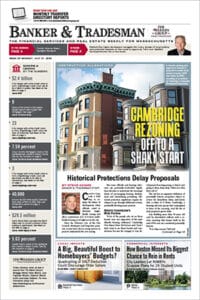When it comes to fighting back against a new state law aimed at getting communities to welcome more housing, Winthrop could be the next Milton.
In February, Milton voters snubbed their nose at the law, which requires cities and towns served by the MBTA to approve new zoning for multi-family housing. Attorney General Andrea Campbell wasted little time before taking the town to court. “The MBTA Communities Law was enacted to address our region-wide need for housing, and compliance with it is mandatory,” she said.
Her lawsuit was aimed not only at forcing Milton to fall into line but was a warning shot to other communities where opposition to the law was brewing.
It seems to be falling on deaf ears in Winthrop.
The town of 19,000, which sits on a small peninsula jutting into Boston Harbor, is becoming the latest flashpoint of resistance to the law, with some elected officials and residents vowing to fight a state mandate they say encroaches on the local control communities should have over zoning and development.
“I hope the town council takes a stand for the future of the town and says no,” state Rep. Jeffrey Turco told the Winthrop Transcript in March. “If you want to sue us, sue us,” he said of state officials’ insistence that communities have no choice but to adopt new zoning that complies with the law. Turco did not respond to a request for comment.
The MBTA law, which covers 177 cities and towns and cities within a certain distance of MBTA routes, has become the focus of a high-stakes battle pitting state power against local control.
Technically, only two towns – Milton and Holden – are out of compliance with the new housing law, because they faced an earlier deadline to comply, at the end of 2023. But other communities where there is resistance to the law, like Winthrop, have had time to organize as the state waits for the Supreme Judicial Court to decide on Campbell’s case against Milton.
When Campbell filed her suit in February she asked the court to take up the case quickly, well in advance of the December deadline Winthrop and a large batch of other communities face to comply with the law, precisely to avoid this situation. But the court opted not to hear the case until October.
Leading the Winthrop battle is a group of about 80 residents, who have used a process detailed in the town’s charter to push a citizen’s petition that would block any new zoning changes to comply with state law. The residents have formed a group called “Winthrop Says No To 3A,” a reference to the section of the state zoning code that the MBTA Communities Act is part of.
The town planning board has been attempting to draft a plan that would put Winthrop into compliance with the state law. But a leader of the resident group, Diana Viens, insists that the town council must vote on the citizen petition before considering new zoning.
The town attorney, James Cipoletta, wrote in a report to the town council that the petition would violate the Massachusetts Constitution by refusing to comply with state law and that state statute supersedes the town’s zoning ordinance.
Viens filed a lawsuit on July 31 against the town council and the town attorney to try to force them to consider the citizen’s petition. She also filed another citizen petition to the town council that would require every decision related to the MBTA law to be decided by a town-wide ballot question rather than a council vote.
Cipoletta has said that this petition can go forward, and the council is required to adopt it, reject it, or amend it within 30 days.
Along with Turco, several town leaders have come out against the new state law, which would require Winthrop to create zoning for up to 882 new housing units.
The town council president, Jim Letterie, has said he’s against any mandate to zone for new housing. “I’m a no at 800 units,” he said at a February meeting. “I’m a no at one unit. Not because of the number of units, but because we are being told what to do with our town.”
It’s unclear what the town’s timeline is for voting on a plan to comply with the state law. Letterie did not return phone messages or respond to an email.
Winthrop’s town manager, Tony Marino, and several other councilors also did not respond to multiple messages.
Viens, the leader of the citizen group, and other residents have argued that the new law presents a significant threat to Winthrop because of its geographical characteristics and said that the town can’t handle more density. Viens said more housing would leave residents “trapped” on a peninsula with only two roads out.
Opponents of rezoning say more housing would overwhelm the town’s schools and warn that increased traffic will make it hard for ambulances to respond quickly to emergencies.
Not everyone is lining up against the law. Mike Kinlin, who has lived in Winthrop for more than a decade, says the town needs more housing in order to increase its tax base and that adding to the housing supply will ultimately ease price pressures that have sent housing costs soaring. Kinlin called the litany of horrors from the new law ticked off by opponents “bad dreams.”
“This is not adults having a serious conversation. You’re literally just having nightmares about things while sitting on Facebook,” he said, referring to a Facebook group that opponents formed.
Kinlin is part of a group in town called “Winthrop Working Together,” which is working with Abundant Housing, a statewide pro-housing group, and other organizations to promote conversations about what would be best for Winthrop.
The state has said towns that don’t comply with the new law will not be eligible for a set of state grants to municipalities. Kinlin is particularly angry at comments made by Turco, the state rep, suggesting he’s fine with losing state grants if that’s the price that must be paid for resisting the new zoning mandate.
“It’s absolutely infuriating, because we do need that money and we do want that money, and it’s absurd for him to think he’s speaking for the people in my neighborhood,” Kinlin said.
Sen. Lydia Edwards of East Boston, who also represents Winthrop, penned an op-ed earlier this year in the Winthrop Transcript saying there is a lot of “misinformation, fear, anger, and confusion” around the law. Edwards urged the town to comply with the law while working with the Healey administration to lower the housing unit requirement in Winthrop, as some other towns have done.
“At this moment, Winthrop is being called to do her part to deal with the housing crisis,” Edwards wrote. “We can choose to follow in the footsteps of Milton, currently entangled in legal challenges, financial denials, public scrutiny, and increasing costs. Or we can emulate Hull and North Andover, whose proactive engagement with the Healey administration led to a more favorable reassessment of their housing unit requirements. This choice saved them time, money, and the uncertainty that comes with resistance. Let’s choose the latter path.”
For its part, the state’s Executive Office of Housing and Livable Communities, pointed to the ongoing housing crisis and said the MBTA Communities law allows towns and cities leeway in crafting details of their own zoning plan, as long as they comply.
“Massachusetts residents are experiencing a housing crisis and the MBTA Communities law was passed overwhelmingly by the Legislature to remove barriers to building more homes while providing flexibility for cities and towns to develop zoning that works for their unique needs,” Kevin Connor, a spokesman for the office, said in an email.
This article first appeared on CommonWealth Beacon and is republished here under a Creative Commons license.![]()






